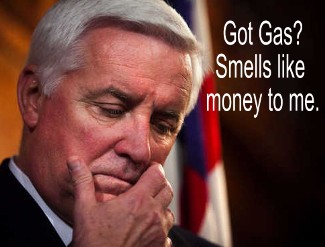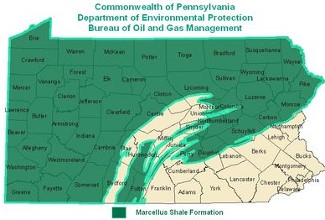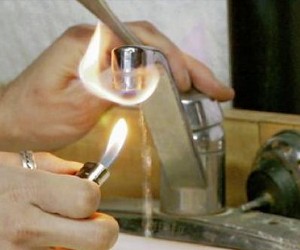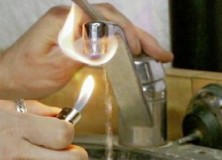 For those of us who live in Northampton County, we don’t hear a lot of news about fracking being used in the oil and gas industry. That’s because most of the fracking being done in Pennsylvania is taking place in its western and northern counties.
For those of us who live in Northampton County, we don’t hear a lot of news about fracking being used in the oil and gas industry. That’s because most of the fracking being done in Pennsylvania is taking place in its western and northern counties.
For those unfamiliar with “fracking,” other than it being used as an expletive that replaced the F-bomb word on a science fiction series years ago, fracking is far more than a curse word. Although, using it as such in relation to how it is affecting our ecology and health is appropriate.
“Fracking,” as it is known in the oil and gas industry involves releasing small pockets of gas trapped in the shale layer located mostly around 7000 feet below the ground and then collecting the gas. It isn’t as simple as drilling a hole to that level and waiting for the commodity to rise up.
Since I’m writing about gas collection I will stick to that subject, though fracking for oil has similar problems in other states.
Pennsylvania sits on a rich gas deposit known as the Marcellus Shale Formation. Marcellus Shale lies beneath 75% of Pennsylvania and extends to the northwest borders of Northampton, Lehigh, and Berks counties.
To extract the gas from this shale deposit requires drilling a hole about 1.5 miles down to reach the shale formation and then drilling sideways about 4000 feet, within the layer of shale. After an initial shock is made to crack the shale layer, induced hydraulic fracturing or hydrofracturing, is performed by using water mixed with sand and chemicals, and the mixture is injected at high pressure into the wellbore to create smaller fractures (typically less than 1mm), along which fluids such as the gas may migrate to the well. Hydraulic pressure is removed from the well, then small grains of proppant (sand or aluminium oxide) hold these fractures open once the rock achieves equilibrium.
While the gas industry would have us believe it is safe and will save us from our dependence on foreign energy supplies, that is far from the truth.
 Our economy is oil based. That’s liquid petroleum, not gas. In fact, gas prices have reached such a low that these same gas companies who are extracting the gas from Marcellus Shale are planning to ship it overseas for better prices.
Our economy is oil based. That’s liquid petroleum, not gas. In fact, gas prices have reached such a low that these same gas companies who are extracting the gas from Marcellus Shale are planning to ship it overseas for better prices.
Their claim of the process being safe is the most disconcerting.
In order to get to the gas deposits the gas companies drill through our aquifers. The aquifers are basically the underground water supply that people use for wells and irrigation. Aquifers can make their way to the surface by way of springs, enter our streams and rivers, and then find their way back to the underground. Nobody knows how far an aquifer may travel, or even how they may all be connected. What is known is that it is a delicate system and if polluted the effects of that pollution can be felt far beyond the point of ground zero, where the contamination occurred.
What type of contamination can be introduced into our aquifers?
The methane gas for one. The video below should be watched, if only to get an understanding of the problem from a source other than what the US media provides us.
Advance to approximately the 7:30 minute mark that discusses Marcellus Shale area of PA.
The others contaminants are the chemicals used by the gas companies for the fracking process.
A 2010 congressional investigation revealed that Halliburton and other fracking companies had used 32 million gallons of diesel products, which include toxic chemicals like benzene, toluene, ethylbenzene, and xylene, in the fluids they inject into the ground.
A 2013 Duke University study sampled water downstream from a Pennsylvania waste water treatment facility from 2010 through 2012 and found that creek sediment contained levels of radium 200 times background levels. The surface water had the same chemical signature as rocks in the Marcellus Shale formation along with high levels of chloride.
These chemicals (and radium contamination) are only the tip of the iceberg. For a partial list of chemicals used in fracking and their health effects, click here.
At the federal level, natural gas developers have long been allowed to keep the exact mixture of chemicals they use in fracking fluid a secret from the general public, protecting it as “proprietary information.” The industry is exempt from the Environmental Protection Agency’s Toxics Release Inventory – the program that ensures that communities are given information about what companies are releasing. In 2005 the industry successfully lobbied for an exemption from EPA regulation under the Safe Drinking Water Act as well, in what is often referred to as the “Halliburton Loophole.”
The oil and gas industry loves the fact that they can testify before congress that there is “no evidence of contamination.” It can’t be proved that radium came from their disposal of used fracking fluid and all settlements of wrongdoing with individuals who have sued the gas industry have been sealed with gag orders on the plaintiffs, as part of the settlements. The most recent case was that of Stephanie Hallowich of Hickory, PA, who wasn’t the only one to be included in the “gag order.” Her 7 and 10-year old children are also barred from discussing the settlement “for life.”
She has taken her $750,000 and relocated.
Pennsylvania Governor Corbett seems to have no problem with the secrecy even though on the surface it might seem that he supports disclosure of the chemicals.
Pennsylvania law states that companies must disclose the identity and amount of any chemicals used in fracking fluids to any health professional that requests that information in order to diagnosis or treat a patient that may have been exposed to a hazardous chemical.
But the provision in the new bill requires those health professionals to sign a confidentiality agreement stating that they will not disclose that information to anyone else – not even the person they’re trying to treat.
This may be because Corbett has a large amount of payback due to the gas industry. That payback began after he took office.
Tom Corbett’s first major political appointment after his election as Governor in November 2010 was to name C. Alan Walker, an energy company executive, to head the Department of Community and Economic Development. Corbett also repealed environmental assessments of gas wells in state parks. Within the budget bill, Corbett authorized Walker to “expedite any permit or action pending in any agency where the creation of jobs may be impacted.”
Between 2007 and the end of 2010, the Pennsylvania Department of Environmental Protection (DEP) issued 1,435 violations to natural gas companies; 952 of those violations related to potential harm to the environment. In March 2011, Michael Krancer, the new DEP secretary and a political appointee of Corbett, took personal control over the department’s issuance of any violations. By Krancer’s decree, every inspector could no longer cite any well owner in the Marcellus Shale development without first getting the approval of Krancer and his executive deputy secretary.
On February 14, 2012, Pennsylvania Governor Tom Corbett signed into law Act 13, which revoked local zoning authority to discourage oil and gas development, allowing municipalities to adopt rules on drilling, but preventing them from banning it. The law also allows the state’s Public Utilities Commission to overturn local zoning and decide whether a community is eligible for a share in impact fee revenues, and enables the industry to seize private property for a drilling operation.
 Thankfully, The Pennsylvania Supreme Court ruled Thursday that this 2012 fracking law allowing gas companies to drill anywhere in the state without regard to local zoning laws is unconstitutional.
Thankfully, The Pennsylvania Supreme Court ruled Thursday that this 2012 fracking law allowing gas companies to drill anywhere in the state without regard to local zoning laws is unconstitutional.
So, Corbett still owes the oil and gas industry. They’re putting out a lot of cash for him to be elected our Governor.
Since Pennsylvania has no individual campaign finance limits, the oil and gas industry has been able to donate more than $1,280,000 to Corbett’s campaign for governor and that doesn’t include the $361,207 to Corbett while he was the state’s attorney general.
Some believe that Corbett can bury the fact that he is fracking Pennsylvania raw, and is beholding to the oil and gas industry. His Marcellus Shale Advisory Commission is comparable to actor Charlie Sheen appointing a cocaine supplier as his mentor in a drug rehab program.
Corbett named a dozen oil and gas employees to his new Marcellus Shale Advisory Commission, tasked with determining “a comprehensive, strategic proposal for the responsible and environmentally sound development of Marcellus Shale.”
Nearly half of the appointees were also contributors to Corbett. Of the Commission’s 30 members, 14 members and several of their spouses contributed a combined total of $442,347 to Corbett’s campaigns for Attorney General (2004, 2008, 2010) and Governor (2010). Almost all, 98.7 percent, came from either current or former oil and gas executives and lobbyists.
There comes a point when saving a few dollars on a gas bill doesn’t make up for what we are allowing to be done to our planet, to our state, and to our neighbors. Will that few dollars we’re saving on our gas bill make up for what we will have to pay for bottled water?
Corbett could get himself re-elected if he keeps getting enough money to bombard people with ads that hide the truth about how he is fracking all of us. I’ll post one of his slick campaign ads in which he boasts 200,000 Pennsylvania jobs are supported, thanks to him. A dubious number that many argue is far from accurate, aren’t well paying jobs, and hardly relate to the gas industry (should a pizza delivery person giving a gas company truck driver his order at a motel room qualify as part of that 200,000?).
Disclaimer: On January 4, 2016, the owner of WestEastonPA.com began serving on the West Easton Council following an election. Postings and all content found on this website are the opinions of Matthew A. Dees and may not necessarily represent the opinion of the governing body for The Borough of West Easton.






